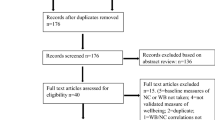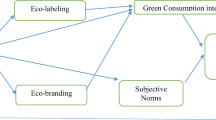Abstract
This study examined how cultural values (self-construal) affect subjective well-being through the proximity of clothing to self among older adults in Taiwan. Data included survey responses from 249 older adults from elderly community centers in Taiwan. Structural equation modeling and bootstrapping were employed to test the hypotheses. This study found that older adults with interdependent selves were more likely to have high subjective well-being through self-esteem derived from proximity of clothing to self. In contrast, older adults with independent selves tended to have high subjective well-being through self as structure derived from proximity of clothing to self. These findings inform researchers, family members, caregivers, and government policymakers about the mechanism behind the relationship between cultural values and subjective well-being, and how psychological closeness of clothing to self mediates the relationship between cultural values (self-construal) and subjective well-being. Further, the results inform useful strategies on how to employ clothing to enhance subjective well-being.

Similar content being viewed by others
References
Allison, D. P. (2001). Missing data. Thousand Oaks, CA: Sage.
Bandalos, D. L. (2002). The effects of item parceling on goodness-of-fit and parameter estimate bias in structural equation modeling. Structural Equation Modeling, 9(1), 78–102.
Baron, R. M., & Kenny, D. A. (1986). The moderator-mediator variable distinction in social psychological research: Conceptual, strategic, and statistical considerations. Journal of Personality and Social Psychology, 51, 1173–1182.
Brown, M. W., & Cudeck, R. (1993). Alternative ways of assessing model fit. In K. A. Bollen & J. S. Long (Eds.), Testing structure equation models (pp. 136–162). New Bury Park, CA: Sage.
Chang, C. W., Osman, M. M., Tong, M. W. E., & Tan, D. (2011). Self-construal and subjective wellbeing in two ethnic communities in Singapore. Psychology, 2(2), 63–70.
Clarke, H. L., Griffin, M., & Maliha, K. (2009). Bat wings, bunions, and turkey wattles: Body transgressions and older women’s strategic clothing choices. Ageing & Society, 29, 709–726.
Cross, S. E., Hardin, E., & Gercek-Swing, B. (2011). The what, how, why, and where of self-construal. Personality and Social Psychology Review, 15(2), 142–179.
Davis, C., & Katzman, M. (1998). Chinese men and women in the United States and Hong Kong: Body and self-esteem ratings as a prelude to dieting and exercise. The International Journal of Eating Disorders, 23, 99−102.
Diener, E. (2000). Subjective well-being: The science of happiness and a proposal for a national index. American Psychologist, 55(1), 34–43.
Diener, E., & Diener, M. (1995). Cross cultural correlates of life satisfaction and self-esteem. Journal of Personality and Social Psychology, 68, 653–663.
Diener, E., Diener, M., & Diener, C. (1995). Factors predicting the subjective well-being of nations. Journal of Personality and Social Psychology, 69(5), 851–864.
Diener, E., & Suh, E. (2003). Measuring subjective well-being to compare the quality of life of cultures. In E. Diener & E. Suh (Eds.), Culture and subjective well-being (pp. 3–12). Cambridge, MA: The MIT Press.
Diener, E., Suh, E., & Oishi, S. (1997). Recent findings on subjective well-being. Indian Journal of Clinical Psychology, 25, 25–41.
Dogan, V. (2015). The effect of materialism and proximity of clothing to self on the ratio of feeling younger: Implications for the consumption experiences of older people in Turkey. International Journal of Consumer Studies, 39(5), 564–573.
Ferry, T. (2017). Revamping healthcare for a changing world. Taiwan Business Review. Received from https://topics.amcham.com.tw/2017/03/revamping-healthcare-changing-world/.
Festinger, L. (1954). A theory of social comparison processes. Human Relations, 7(2), 117–140.
Greenfield, P. M. (1997). You can’t take with you: Why ability assessments don’t cross cultures. American Psychologist, 52(10), 1115–1124.
Hayes, F. A. (2009). Beyond Baron and Kenny: Statistical mediation analysis in the new millennium. Communication Monographs, 76(4), 408–420.
Heine, S. J. (2008). Cultural psychology. New York, NY: Norton & Company Inc.
Hsu, Y., Lu, J. H. F., & Lin, L. L. (2013). Physical self-concept, possible selves, and well-being among older adults in Taiwan. Educational Gerontology, 40(9), 666–675.
Hu, L. T., & Bentler, P. M. (1999). Cutoff criteria for fit indexes in covariance structure analysis: Conventional criteria versus new alternatives. Structural Equation Modeling, 6, 1–55.
Kaiser, B. S. (1996). The social psychology of clothing: Symbolic appearances in context. New York, NY: Fairchild Books.
Kwon, Y. H. (1994). Feeling toward one’s clothing and self-perception of emotion, sociability, and work competency. Journal of Social Behavior and Personality, 9(1), 129–139.
Lee, Y. A. (2011). Clothing as an environment for older adults’ successful ageing. International Journal of Consumer Studies, 35(6), 702–710.
Lee, Y. A., & Sontag, M. S. (2010). An assessment of the proximity of clothing to self scale for older persons. International Journal of Consumer Studies, 34(4), 443–448.
Liu, C. & Kao, E. (2017). Taiwan’s aging index breaches 100 mark as society continues to age. Received from http://focustaiwan.tw/news/asoc/201703090017.aspx.
Lu, C. (2008). Culture, self, and subjective well-being: Cultural psychological and social change perspectives. Psychologia, 51, 290–303.
Lu, L., & Gilmour, R. (2006). Individual-oriented and social-oriented cultural conceptions of subjective well-being: Conceptual analysis and scale development. Asian Journal of Social Psychology, 9, 36–49.
Lu, L., & Gilmour, R. (2007). Developing a new measure of independent and interdependent views of the self. Journal of Research Personality, 41(1), 249–257.
Lu, L., Kao, S. F., & Hsieh, Y. H. (2010). Positive attitudes toward older people and well-being among Chinese community older adults. Journal of Applied Gerontology, 29(5), 622–639.
Lu, L., & Yang, K. S. (2006). Emergence and composition of the traditional-modern bicultural self of people in contemporary Taiwanese societies. Asian Journal of Social Psychology, 9, 167–175.
Markus, H. R., & Kitayama, S. (1991). Culture and the self: Implications for cognition, emotion, and motivation. Psychological Review, 98(2), 224–253.
Muthén, L. K., & Muthén, B. O. (2007). Mplus: Statistical analysis with latent variables user’s guide. Los Angeles, CA: Muthen & Muthen.
Oishi, S., Diener, F. E., Lucas, E. R., & Suh, M. E. (1999). Cross-cultural variations in predictors of life satisfaction: Perspectives from needs and values. Personality and Social Psychology Bulletin, 25(8), 980–990.
Oishi, S., Schimmack, U., Diener, E., & Suh, M. E. (1998). The measurement of values and individualism-collectivism. Personality and Social Psychology, 24(11), 1177–1189.
Peters, C., Shelton, A. J., & Thomas, B. J. (2011). Self-concept and the fashion behavior of women over 50. Journal of Fashion Marketing and Management, 15(3), 291–305.
Poon, C. Y. M., & Fung, H. H. (2008). Physical activity and psychological well-being among Hong Kong Chinese older adults: Exploring the moderating role of self-construal. The International Journal of Aging and Human Development, 66(1), 1–19.
Posner, A. R. (1977). Aging and old age. Chicago: University of Chicago Press.
Shih, M. Y., & Kubo, C. (2005). Body shape preference and body satisfaction of Taiwanese and Japanese female college students. Psychiatry Research, 133(2–3), 263–271.
Shin, D. C., & Johnson, D. M. (1978). Avowed happiness as an overall assessment of the quality of life. Social Indicators Research, 5(4), 457–492.
Singelis, T. M. (1994). The measurement of independent and interdependent self-construals. Personality and Social Psychology Bulletin, 20(5), 580–591.
Sontag, M. S., & Lee, J. (2004). Proximity of clothing to self scale. Clothing and Textile Research Journal, 22(4), 161–184.
Taiwan Aging. (2015). EFE. Retrieved from http://www.efe.com/efe/english/life/taiwan-is-the-world-s-fastest-ageing-nation-this-decade/50000263-2741487.
The International Silver Economy Portal. (2017). The ageing population. Retrieved from http://www.silvereco.eu/statistics/.
Triandis, C. H. (2003). Cultural syndromes and subjective well-being. In E. Diener & E. Suh (Eds.), Culture and subjective well-being (pp. 13–36). Cambridge, MA: The MIT Press.
Usha, C. (1991). Clothing and self-esteem of institutionalized elderly female: Two experiments. Educational Gerontology, 17(6), 527–541.
World Health Organization. (2015). Ageing and health. Retrieved August 8, 2016 from http://www.who.int/mediacentre/factsheets/fs404/en/.
Author information
Authors and Affiliations
Corresponding author
Additional information
Publisher's Note
Springer Nature remains neutral with regard to jurisdictional claims in published maps and institutional affiliations.
Rights and permissions
About this article
Cite this article
Chen, WC. How Cultural Values Affect Subjective Well-Being Among Older Adults: The Role of Proximity of Clothing to Self. J Happiness Stud 22, 95–111 (2021). https://doi.org/10.1007/s10902-020-00220-0
Published:
Issue Date:
DOI: https://doi.org/10.1007/s10902-020-00220-0




